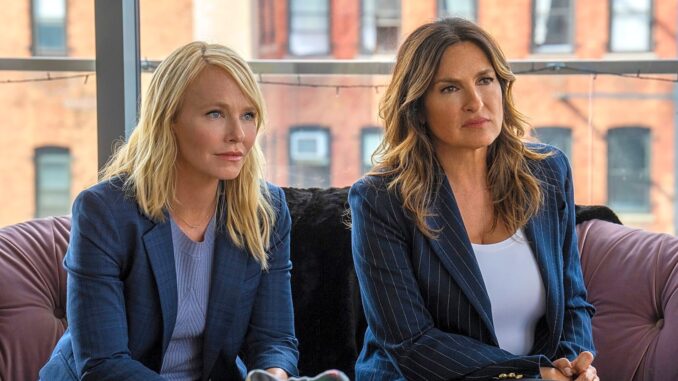
The Echo of Sisterhood: Kelli Giddish, Mariska Hargitay, and the Enduring Power of Rollins-Benson
In the sprawling, often brutal landscape of Law & Order: SVU, where trauma and resilience dance a constant, agonizing waltz, the human connections forged both on and off-screen become the oxygen that sustains its beating heart. At the core of this enduring legacy lies a profound, multi-layered bond: the real-life friendship between Kelli Giddish and Mariska Hargitay, and its poignant, powerful reflection in the partnership of their characters, Amanda Rollins and Olivia Benson. Giddish, as she reflects on her time and relationship with Hargitay, unveils not just a professional camaraderie, but a testament to sisterhood – a force that imbued the Rollins-Benson dynamic with an undeniable, resonant power.
When Kelli Giddish joined the cast of SVU as Detective Amanda Rollins, she stepped into a formidable legacy. Mariska Hargitay, embodying Olivia Benson for over a decade, was not just the show’s star, but its very anchor. It could have been an intimidating dynamic, but Giddish’s reflections speak to something far warmer, a nurturing embrace that quickly blossomed into genuine affection. Hargitay, the seasoned veteran, became a mentor and a friend, guiding Giddish through the complex rhythm of a long-running procedural, and more importantly, through the emotional demands of portraying such a deeply flawed yet resilient character.
Giddish often speaks of Hargitay’s generosity, her unwavering support, and the deep, unspoken understanding that grew between them. Their friendship was forged in the crucible of late-night shoots, the shared weight of emotionally draining storylines, and the mutual respect for their craft. It was in the quiet moments backstage, the shared laughter between takes, and the profound conversations about life, motherhood, and the challenges of their roles, that their bond solidified. This wasn’t merely a co-worker relationship; it was a sisterhood, built on a foundation of trust and affection that transcended the studio lot. “She’s always been there for me,” Giddish has shared, “and that means so much.” This authentic, off-screen connection was the silent, potent ingredient that flavored every scene Rollins and Benson shared.
And what a sharing it was. The power of Rollins-Benson wasn’t about hierarchy or a simple boss-employee dynamic; it was a nuanced, evolving tapestry of mentorship, vulnerability, and fierce loyalty. When Amanda Rollins arrived, she was a whirlwind of contradictions: brilliant but reckless, deeply empathetic yet prone to self-destruction. Olivia Benson, initially her commanding officer, swiftly became her steadfast rock. Benson’s patience, her quiet counsel, and her unwavering belief in Rollins, even when Rollins herself faltered, shaped Amanda’s journey from a troubled detective to a woman finding her footing, both professionally and personally.
We saw this power in countless moments: Benson’s gentle but firm interventions during Rollins’s gambling addiction, her protective stance when Amanda faced personal demons, and her understanding gaze as Rollins navigated motherhood. It wasn’t a relationship without its bumps – Benson often had to rein in Rollins’s more impulsive tendencies – but it was always underscored by an unshakeable bond. Olivia didn’t just manage Rollins; she mothered her, mentored her, and loved her like a younger sister. And Rollins, in turn, became Benson’s loyal confidante, her sharp mind often providing critical insights, her presence a quiet strength in Olivia’s own moments of solitude and leadership burden.
The power of Rollins-Benson, therefore, wasn’t measured in dramatic confrontations or heroic rescues, but in the quiet strength of their consistent presence for one another. It was the power of female solidarity in a world designed to break women down. It was the power of a gaze that understood without words, a hand placed gently on a shoulder that conveyed more comfort than any speech. It was the power of allowing oneself to be vulnerable with a colleague, knowing that empathy, not judgment, would be returned. Their partnership illustrated that true strength isn’t just about fighting crime, but about holding each other up in the face of relentless darkness.
Kelli Giddish’s reflections on her friendship with Mariska Hargitay are not just fond memories; they are a key to understanding why the Rollins-Benson dynamic resonated so deeply with audiences. The authentic love and respect between the actresses seeped into the fabric of their characters, making their on-screen bond feel utterly real and profoundly moving. When Giddish speaks of Hargitay, she speaks of a guiding light, a supportive sister, and a rare connection. That light, that support, that connection, undeniably flowed into Olivia Benson and Amanda Rollins, transforming a fictional partnership into a powerful illustration of the enduring strength found in human connection, in sisterhood, and in the unwavering belief in one another, even in the darkest of times. The echo of their real-life bond will forever resonate in the legacy of SVU, a poignant reminder that even amidst the grittiest narratives, love and friendship remain the most compelling forces.
